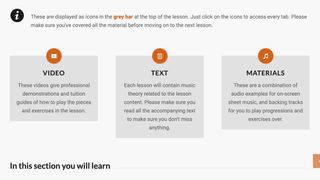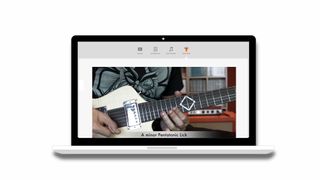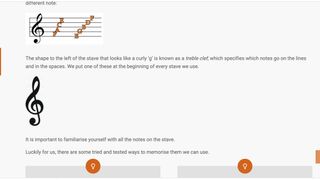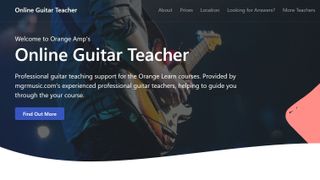Orange Amps might not be the most recognisable name in guitar playing or teaching outside of the industry but its history and reputation among musos is rock solid. Founded in the late sixties by Clifford Cooper, the brand first became known for its striking 'Pics Only' amplifier, which came complete with hieroglyphic symbols and an iconic warm and crunchy sound.

Price: Roughly $11.31/ month or 135.80/ year for beginners
Styles: Rock, classic rock
App: None
Free Trial: One month
An educational arm might seem like it might pale in comparison with courses offered by guitar brands such as Fender or some of the more high-profile solo players but this is a well-thought-out set of courses suitable for all ranges and ages. We actually think it offers some of the best guitar lessons online – and the foundation course is free with the purchase of any Orange Amp.
It’s also the first fully accredited online guitar course in the UK and EU, offering certificates equivalent to the UK’s eight-grade system. This might not be a massive draw to US learners, but working by this grade system should still give you a solid sense of progression as you work through the various skills levels.
Ease of Use
As far as being clear and understandable goes, Orange Amp courses are straight up. From the get-go each level is laid out for you. The foundation course tempts with the promise of the fundamentals of rock guitar, such as power chords and open chords, progressing to basic sight-reading and chord progressions. The course also progresses through intermediate (bar chords, improvisation and theory) to advanced (modal playing, sight reading and advanced improv).
Each course is split into three modules containing a series of lessons (usually around 16 or 17). These include bite-sized videos, quizzes, practice tests and tips. You also get downloadable course learning material, an exam syllabus and mock exam tests.

From the start, the progress is made clear, without being patronising. Each step is outlined and the downloadable printable materials are easy to understand and offer extremely clear instruction on things like, for example, “how to hold the guitar” and “rhythm notes and note values, rests bars and time signatures” to the difference between major and minor chords. Aside from being a good intro to guitar, it’s a great grounding in music theory.

Videos are clear and load quickly, with every chord explained clearly and carefully with nice detail such as “we’re only going to strum the strings that our fingers are on”, small things that a complete beginner might need to know but wouldn’t. They also contain boxed out close-ups of fingers alongside the main body of the guitar, which is a really nice touch. These videos can be watched as many times as needed and stopped throughout. The C major “rock god bonus” video, to take one example, has an impressive riff slowed right down. It’s real “behind the magic” stuff.
Each course even tells you how much time it thinks you should need to spend on it to progress, so you can set aside the right amount of time in your life to do it justice and you aren’t left feeling short-changed.
It feels like someone’s done some really good customer testing here and it really shows up in the smaller details.
Suitability for beginners
Online music courses can vary so much and some assume far too much knowledge and others none at all. This set of courses seems to have found the sweet spot. If you’re a beginner and you’ve never even picked up a guitar before, you’ll learn to do that first. If you’ve got some basic knowledge but aren’t quite ready to hit bar chords yet then you can spend some time noodling around learning about arpeggios.

One small criticism would be that for a complete beginner, a skim read of the entire foundation course materials in one go might seem overwhelming but that’s mostly because they’re so comprehensive. Take it slowly, bit by bit and it’s suitable for even the most timid player.
Suitability for advanced players
If you’ve been playing for years but want to solidify some of your knowledge, there’s a level for you. If you’re an already competent guitarist but struggle to improvise, the backing tracks with accompanying notation will help you get started. If you want to get really technical you can do so very quickly, jumping straight into finding out about Alex Lifeson’s use of sus4 bar chords instead of hanging around at the “learning about modes” stage. It’s very easy to skip lessons too if you feel it’s time to move on. There are quizzes, but nobody’s keeping score if you don’t want them to.
Extra Features
Unlike other guitar learning courses – including Fender Play and Justin Guitar – the Orange Amps courses come with optional online accreditation so you can follow the courses at your own pace or you can make it official and get a certificate for your efforts (all explained in the accompanying syllabus).

There’s also a Need Help option, which allows you to send a qualified tutor a question in real time, really handy when you can’t work out if it’s you or your D string’s that’s out of tune, if your diatonic and chromatic intervals are vexing you or you can’t tell your hammer-ons from your pull-offs.
There is a strong female voice/player throughout the material, which is unusual as many guitar tuition guides are led by men. For those of us who struggle to see ourselves represented in rock guitar coverage, this is welcome.
Price
Pricing for these courses is straightforward - but as Orange Amps is a UK-based company, you'll likely see the prices translated into dollars, so costs might not be represented by whole numbers.
You can access all courses for £7.99 per month ($11.30) with a one-month free trial. This covers foundation, intermediate and advanced. Or you could opt for the foundation course for £95.99 ($135.80) including exam and certificate, the intermediate for £107.99 ($152.77) or advanced for £119.99 ($169.70). It’s worth noting too that the foundation course is free with the purchase of any Orange amp.
Should you use Orange Learn?
These courses represent really excellent value for money. Well-researched and tested, they seek to iron out some of the main questions asked by beginner guitarists and they also cater perfectly to those with some knowledge/ability but little formal grounding. They’re well worth the investment, in our opinion, and you may well find that the lessons are so addictive you won’t want to stop at just one level.


